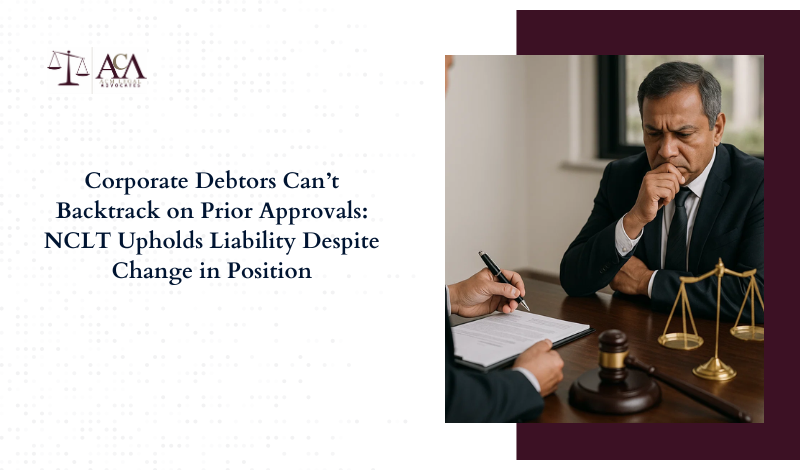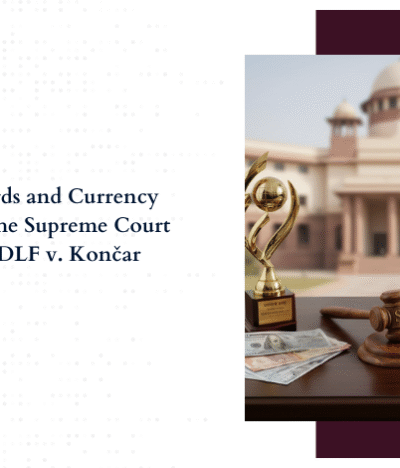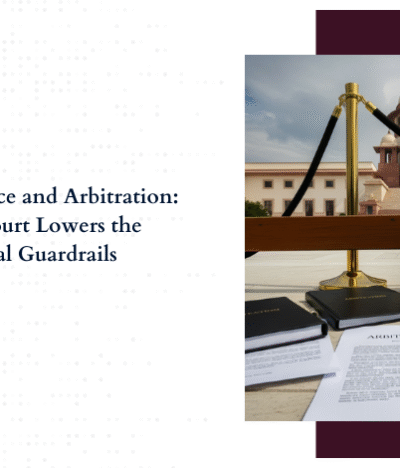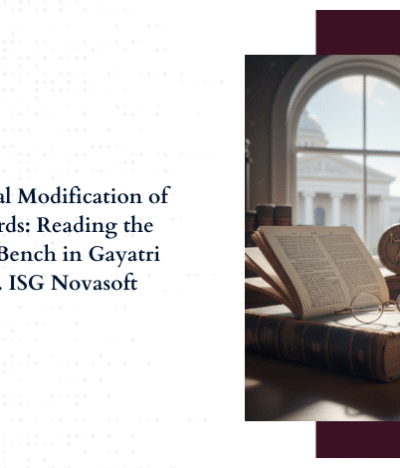I. Introduction
In a significant ruling delivered on 9th May 2025, the National Company Law Tribunal (NCLT), New Delhi Bench, admitted an application under Section 9 of the Insolvency and Bankruptcy Code, 2016 filed by M/s Liberium Global Resources Pvt. Ltd. against M/s Amritsar MSW Limited. The tribunal reiterated a fundamental principle of law: a corporate debtor cannot deny liability for a transaction it has earlier approved and partially complied with.
This case has wider ramifications for corporate governance and financial discipline, especially in the context of concessionaire-led public-private partnerships and multi-party service arrangements.
Insolvency and Bankruptcy Code: Enforcing Accountability
The corporate debtor attempted to dodge payment obligations for revised wages under the guise of ongoing litigation challenging a wage notification. However, the Tribunal dismissed this defense, holding that once a corporate debtor has approved and even acted upon a transaction, it cannot later reprobate on it merely due to internal disputes or extraneous legal challenges.
II. Factual Matrix: From Concession to Contradiction
The dispute arose out of a public waste management project in Amritsar, originally awarded to Amritsar MSW Ltd. (the “Corporate Debtor”) under a Concession Agreement dated 18 March 2016. The operational tasks, including human resource management, were outsourced to Liberium Global Resources Pvt. Ltd. (the “Operational Creditor”) through a Sale Agreement effective from 1 April 2018.
In 2020, Averda Waste Management Investments India Pvt. Ltd., a global player in waste management, took over operational control via a Supplementary Concession Agreement. As per this agreement, Averda (on behalf of the Corporate Debtor) explicitly assumed liabilities including labour compliance, taxes, and charges arising from regulatory changes.
When minimum wages were revised in Punjab in November 2021, the Operational Creditor sought approval for a revised salary structure. Emails dated 20th and 22nd December 2021 from Averda (acting on behalf of the Corporate Debtor) explicitly approved this revised wage structure. Consequently, Liberium adjusted and raised invoices accordingly.
However, in March 2022, Averda unexpectedly reversed its stance, citing a pending High Court challenge against the wage notification—despite no stay order being in force. Further, despite having paid the invoice for December 2021 inclusive of the revised wages, the Corporate Debtor refused to honour subsequent invoices. Eventually, the agreement was unilaterally terminated.
Notably, the Corporate Debtor did not raise any formal dispute until after service of the demand notice under Section 8 of the IBC in mid-2023, well after the invoices in question had fallen due.
III. Legal Analysis
The Tribunal squarely rejected the Corporate Debtor’s contention that the liability was ambiguous or subject to pre-existing disputes. It relied on the following core findings:
- Acknowledgement of Liability: Emails from December 2021 explicitly accepted revised wage liabilities and instructed Liberium to proceed accordingly. This satisfied the requirement under Section 18 of the Indian Evidence Act (now Section 25 of the Bharatiya Sakshya Adhiniyam, 2023) that admissions bind a party unless satisfactorily explained—which the Corporate Debtor failed to do.
- Past Compliance Confirms Acceptance: The Corporate Debtor paid the invoice for December 2021, which included the enhanced wage components, thereby reinforcing the enforceability and binding nature of their prior approvals.
- No Stay from High Court: The debtor’s justification—pending litigation in the Punjab & Haryana High Court—was summarily rejected as no stay on the statutory notification had been granted. The Tribunal held that compliance with a law cannot be stayed on speculative grounds.
- Doctrine of Approbatation and Reprobation: Drawing on the Supreme Court’s judgment in Union of India v. N. Murugesan (2022) 2 SCC 25, the Tribunal emphasised that a party cannot accept a transaction to its benefit and later deny it to avoid its obligations. As the SC stated: “One cannot take advantage of one part while rejecting the rest… a person cannot be allowed to have the benefit of an instrument while questioning the same.”
- Mobilox Principle on Pre-Existing Dispute: Reaffirming Mobilox Innovations Pvt. Ltd. v. Kirusa Software Pvt. Ltd. [(2018) 1 SCC 353], the NCLT held that a vague or belated dispute raised only in reply to a demand notice does not meet the threshold of a “pre-existing dispute” under Section 9 of IBC.
Result: The NCLT found the Corporate Debtor to be in default of an operational debt amounting to ₹2,28,65,774/- and admitted the application for commencement of Corporate Insolvency Resolution Process (CIRP).
IV. Implications of the Judgment
The NCLT’s decision in Liberium Global Resources Pvt. Ltd. v. Amritsar MSW Ltd. fortifies the integrity of commercial transactions and acts as a caution to corporate debtors attempting to evade liability after benefitting from an agreement. Key implications of this ruling are:
- Email Approvals Create Binding Obligations: Even in absence of a formal amendment to a contract, clear email communications—especially those authorising financial outlays—can be treated as binding acknowledgments under the IBC framework.
- Timely Payment Equals Endorsement: By making payment for December 2021 based on revised wages, the Corporate Debtor effectively endorsed the entire revised wage structure. This precedent solidifies the idea that conduct, not just written agreements, determines liability.
- Change in Management Doesn’t Erase Liability: Averda’s takeover of Amritsar MSW Limited did not absolve the Corporate Debtor of its obligations. The Tribunal noted that all responsibilities under the Concession and Supplementary Agreements remained enforceable irrespective of corporate restructuring.
- Challenging a Law Doesn’t Excuse Non-Compliance: Merely pointing to a pending writ petition against a wage notification—without a stay—was deemed insufficient to nullify statutory compliance requirements. This reinforces a crucial legal norm: obligations arising from valid laws cannot be unilaterally set aside unless explicitly stayed by a competent court.
- No Room for Selective Compliance: The ruling clearly discourages corporate entities from practicing ‘selective compliance’—where they honour agreements only when convenient and deny them when financially burdensome.
- Doctrine of Estoppel Applied with Full Force: Quoting from the Supreme Court in N. Murugesan, the NCLT applied the doctrine of estoppel and held that a party who has benefited from a transaction cannot later reject its obligations. This doctrine is now firmly integrated into IBC jurisprudence as a guardrail against opportunistic defaults.
V. Key Contractual Clauses Considered by the NCLT
The Tribunal examined several critical clauses from the underlying agreements to support its conclusions:
- Clause 5.1(c) & (f)(iv) of the Concession Agreement (2016): These imposed non-negotiable obligations on the Corporate Debtor to comply with labour laws and wage revisions, and these obligations were stated to survive even the termination of the agreement.
- Clause 8.11 (Change in Law Clause): The clause made it explicit that any legal amendment—including the revised minimum wages notification—would trigger obligations on the part of the concessionaire to adjust accordingly. Therefore, the wage escalation under the Minimum Wages Act, 1948, stood protected under this clause.
- Clause 3.1 of the Sale Agreement (2019): Liberium was authorised to raise invoices directly on Amritsar MSW Ltd., which it did from April 2018 onwards. The invoices raised during April–September 2022, although disputed later, were consistent with the agreement.
- Supplementary Agreement (2020): It was established that Averda, acting as de facto controller of Amritsar MSW Ltd., had no independent identity in the transaction chain and was, for all practical purposes, the voice of the Corporate Debtor.
These clauses combined with consistent historical conduct formed a watertight case against the Corporate Debtor.
VI. Procedural Compliance and Final Orders
The Tribunal found that the Operational Creditor had satisfied all procedural requirements under Section 9 of the IBC:
- Proper demand notice under Section 8 was issued;
- No valid reply was submitted by the Corporate Debtor within the statutory time;
- All invoices raised were supported by prior approvals and actual services rendered;
- There existed no real pre-existing dispute prior to the demand notice—merely post-facto denials which lacked substance.
Accordingly, the application was admitted and Mr. Deepak Kumar Goyal was appointed as Interim Resolution Professional (IRP) to oversee the CIRP of Amritsar MSW Ltd. A moratorium under Section 14 of IBC was also imposed.
VII. Strengthening the Credit Culture under IBC
The judgment in Liberium Global Resources Pvt. Ltd. v. Amritsar MSW Ltd. is a prime example of the judiciary reinforcing commercial accountability under the IBC. The ruling serves as a deterrent to corporate debtors who attempt to repudiate obligations post facto by misusing legal ambiguities or pending litigation as shields.
It is also a reminder that corporate entities cannot use third-party management changes as a scapegoat to escape liability. When a company acknowledges its obligations in writing, performs part of them, and benefits from services rendered, it cannot later plead non-existence of a contract or a contrived dispute.
This decision reinforces the legal doctrine of approbate and reprobate, emphasising that a party cannot blow hot and cold in the same breath. Such rulings are essential to maintain the sanctity of business transactions and ensure that operational creditors—especially service providers—are not forced into long-drawn litigations for legitimate dues.
FAQs
1.Can an email confirmation be treated as a binding approval in insolvency cases?
Yes. The NCLT in this case held that clear email approval for revised wages created a binding obligation under the IBC, especially when followed by part compliance.
2.Does a pending legal challenge allow non-payment of statutory dues?
No. Unless there is a stay by a competent court, the pendency of litigation does not excuse a party from complying with law.
3.Can a company deny a transaction it has partially performed?
Not under the IBC. The Tribunal applied the doctrine of estoppel and ruled that the debtor couldn’t deny transactions it benefitted from.
4.What is a “pre-existing dispute” under IBC Section 9?
A dispute that existed before the demand notice was served. Vague, belated, or manufactured disputes do not qualify.
5.What happens after admission of a Section 9 IBC petition?
The Corporate Insolvency Resolution Process (CIRP) begins, an Interim Resolution Professional is appointed, and a moratorium is imposed on legal proceedings and asset transfers.
Conclusion
The NCLT’s ruling in this matter not only ensures justice for Liberium Global Resources but also sends a strong message to corporate defaulters: you cannot cherry-pick contractual obligations. Once a transaction is accepted and partially executed, corporate debtors must honour it in its entirety, or risk insolvency proceedings under Section 9 of the IBC.






